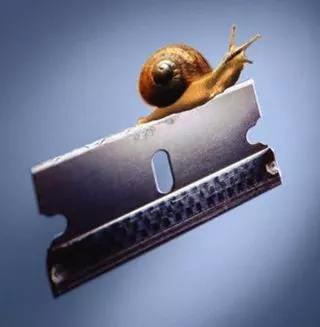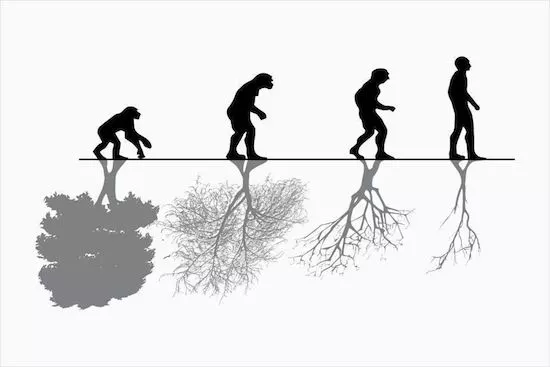“In an atonal world one must oppose it in such a way that one compels it to tonalize itself.” –Slavoj Zizec
“Entities should not be multiplied unnecessarily. When you have two competing theories that make exactly the same predictions, the simpler one tends to be the better one.” Most of us are familiar with this principle attributed to the 14th century logician William of Occam, known as Occam’s Razor, or The Law of Parsimony.
It is a principal typically used in scientific circles to distinguish elegant theories from inelegant ones. But what happens if we apply the same principle to our lives? What if we are caught between two competing lifestyles, does it follow that the simpler one tends to be the better one? How might we be multiplying things unnecessarily? And what if we used the razor as a means toward the end of aggressive progressive change?
This article uses the principle of Occam’s Razor as a meta-symbol for acquiring elegance in the face of excess. We can call it Bob’s Razor or Sam’s Razor, or even Martha Stuart’s Razor. It doesn’t matter. As long as we’re using it to “shave away” what is unnecessary from our lives, then it will be most efficacious. The razor represents our need for striving toward simplicity and consistency despite complexity and inconsistency. So far as it applies to our culture, the razor represents the need to shave away unhealthiness; to thrive in a healthy way despite stagnation and decadence. It takes courage to wield the Razor, but most things worth doing do.
In order to maintain equilibrium in an excessively senseless culture, we need to be able to shave the heaviness from our heart.
We must be able to seek out that which is excessive in our lives and then shed it. This is easier said than done and requires a particular flavor of courage. Shedding the superfluous is a very difficult process. It first needs to be done on an individual level, so that it can eventually be done on a cultural level. Shedding the superfluous from our lives helps us focus on making sense out of human senselessness. Eventually simplicity can lead to elegance. Once excess has been shaved away then we are free to live more elegantly.
Just as brevity is the soul of wit, elegance is the soul of acumen. Faced with the tragedy of a dying world, the simplest lifestyle tends to be the best one. And considering the condition of our natural resources, the more people living simply the better. Gandhi said it best, “Live simply so that others may simply live.”
But in order to live simply we must be able to change our center of gravity from that of inert consumption to that of active adaptation. We need to become local world-movers as opposed to mere global world-watchers. The hardest part will be using the razor to unburden ourselves of material, political, and spiritual excess. Using the razor causes our cultural ideas, hypotheses and theories to become more elegant in regard to healthy, ecological order.

Finesse and precision of thought are the goal here. Like Lewis Carroll said in his 1884 lecture, “Avoid having a FAT MIND.” We avoid having a fat mind by using the razor. By relinquishing ourselves to the razor we allow ourselves to be refined and polished. We allow ourselves to become vulnerable so that we might become numinous. We become numinous after trimming the fat of hyper-reality from actual reality, after shaving the opacity from the luminous.
The more we “trim the fat” the sharper we become, refining our innocence into focused courage, which leads to mindfulness and holistic thinking. But we must apply our new-found sharpness with responsibility. By showing respect and compassion to others, as well as to our environment, we indirectly become teachers who help others to shave the heaviness from their hearts.
Once we’ve shaved enough excess from our lives, we eventually reach a kind of existential liberation where we go beyond shedding superfluity and move to outright decollation. What I call McGee’s Guillotine. My Occam’s Razor answer to cognitive dissonance, which, paraphrasing Occam, states: Worldviews should not be aggrandized unnecessarily.
When you have two competing worldviews that disagree with each other, the healthier one tends to be the better one and the unhealthier one should be discarded. McGee’s Guillotine strips away the ignorance of human opinion and replaces it with natural dictation. It goes beyond shedding superfluity and cuts the human head out of the equation so that a “new head” can grow: open-minded, non-dogmatic and fluid in its self-actualization of the original equation: reality as it is, divorced from the hyper-reality and abstraction of the unhealthy worldview.
In the end, the razor and the guillotine are tools that teach us healthy circumspection. With them we are ready to flip the switch on all unhealthy worldviews and unsustainable cultures. We are prepared to oppose the atonal world in such a way that it is compelled to tonalize itself.
Image Source:
Snail on a Razor
Devolution
La Guillotine by Oscar Dominguez






